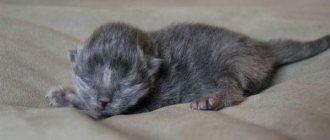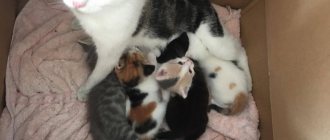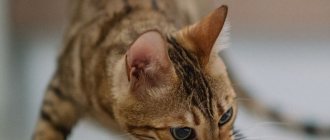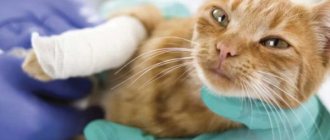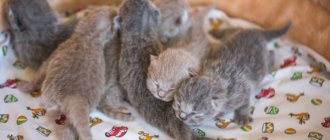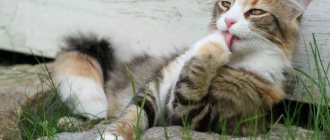In the animal world, an unpleasant and even shocking, in human judgment, situation can happen when a cat eats kittens. Sometimes this happens as soon as the offspring are born, and sometimes the mother cat does this some time after giving birth. Such a fate can befall one kitten, and sometimes all of them at once... In this article we will look at the natural and pathological causes of cannibalism in cats. Why can a cat eat its kitten? Is this an accident or a pattern? Is it necessary to treat this condition of the animal? In this material we will answer these and other questions and talk about the main reasons for this phenomenon.
The essence of the problem
The cause of cannibalism in cats may be genetic failures or heredity
Cannibalism is a phenomenon in which organisms are eaten by individuals of their own species. Currently, scientists know that about 1,300 species of living beings practice cannibalism to one degree or another. This number includes insects, amphibians, reptiles, birds, mammals and even humans. Cannibalism can be considered as a manifestation of intraspecific competition, a consequence of natural selection. According to scientists' observations, the cause of intraspecific predation is most often a lack of food and water caused by population overdensification or unfavorable environmental conditions.
As for cats specifically, cannibalism is inherent in them in extremely rare, if not exceptional, cases. Common causes include, for example, accidentally eating a kitten along with the placenta during birth, biting off tails or paws during excessive grooming, eating non-viable kittens, or postpartum eclampsia. The cause may also be genetic failures or hereditary cannibalism, when a cat receives the corresponding genes from its ancestors. It is noteworthy that there are no authoritative scientific works devoted to this phenomenon in cats, but based on the available materials, let's try to figure out what to do if you witness a cat eating its kittens, what reasons there may be for this, and warn newborn kittens against this.
Exhaustion of the animal
Embryos maturing in the womb of a cat require a considerable amount of protein substances. That is why a pet during pregnancy spends a lot of energy on bearing offspring. Some pets tolerate such a delicate situation so hard that they begin protein starvation. That is, the cat sees its kittens after birth as a source of protein food. This is a common reason why cats eat their kittens.
We invite you to familiarize yourself with the Ferret, which is dangerous to humans. How to get rid of a ferret in a chicken coop? Electrical outlets and cords
What’s interesting is that if a cat lives at home, eats normally and receives all the necessary care from its owner, you don’t have to worry about such an outcome. This kind of situation is most often observed in homeless animals, which become exhausted during pregnancy and lose not only proteins, but also minerals and other useful enzymes required for full development.
Natural causes of cannibalism
cannibalism among domestic cats is more likely an accident, from which, however, we cannot be insured
It's more of a coincidence. From which, however, we are not immune. Among them, it is worth highlighting the killing of a kitten by a mother cat in her sleep. Cats are extremely kind and caring towards their own and sometimes other people’s offspring, but misfortunes do happen: cases when a cat carelessly strangles kittens with her body in a dream do occur. Accidents include murder by eating the placenta. After giving birth, the mother cat is extremely exhausted and exhausted. Feeling that there are life-giving substances in the placenta, cats often eat the placenta after the birth of the next kitten. It happens that a cat eats its newborn along with her. The fact is that it is not always possible to gnaw the umbilical cord without harming the kitten; as a result, the newborn may receive injuries incompatible with life. By the way, this is one of the reasons why owners need to be present during the birth of their pet and keep everything under control. From random reasons, let's move on to natural ones, in other words, why a cat can deliberately kill a kitten.
The kitten was born sick or dead
The cause of cannibalism among cats may be a natural instinct
Offspring with physiological problems can cause cannibalism in cats. Among the main reasons are the following:
- The kitten has congenital anomalies;
- The kitten was born sick or physically underdeveloped;
- A newborn with a cat mother has a different Rh factor of the blood, in this case the kitten is in mortal danger and without the intervention of the animal’s owners the kitten most likely will not survive;
- The cat ate a newborn who died of natural causes.
In the latter case, the cause of cannibalism was a natural instinct. Just like the placenta, it is a source of nutrients for her. Cats are not people; they do not tend to mourn the loss of their offspring. The same applies to nursing underdeveloped and weak kittens. A mother cat will not nurse such as humans would. If a cat sees that a newborn will not survive, it is more likely to kill it than to allow it to suffer and suffer, delaying the inevitable. This is the essence of natural selection. If you have witnessed a cat biting a kitten to death after giving birth, perhaps you shouldn’t be shocked; it’s just that she instinctively understands better than you who will live and grow up healthy and strong, and who was doomed from the very beginning.
Exhaustion of the cat
As we figured out, a mother cat can accurately “diagnose” her offspring, and she herself determines which babies she can feed for sure, so that the strongest representatives of the family can survive and continue the cat family. After all, it is extremely important that hereditary defects and diseases are not passed on to future generations. But this is not the only reason. Hunger can extremely rarely cause cannibalism in cats, but such cases have been recorded. If a cat eats other people's kittens, in addition to extreme exhaustion, it may be driven by a feeling of competition or jealousy. There are practically no described cases of hunger as a cause of cannibalism towards their offspring in domestic cats. But if you do witness your cat eating her kitten, the first step is to isolate the remaining kittens in a safe, warm and dry place. Take measures to calm the mother cat, possibly even using tranquilizers. However, no later than 24 hours later, return the kittens to the cat so that the babies can eat their mother’s colostrum.
Numerous litter
the large number of litters cannot be a reason for cannibalism among domestic cats
There are no mentions of such cases among domestic cats, but for wild nature this is normal. The reason is banal: cats are trying to help their offspring survive, given a large litter and a lack of food, the cat is forced to make a selection. In terms of food, the cat leaves the strongest and most physically fit kittens, and eats the weakest ones. Thus, the survival of the fittest occurs and the aforementioned natural selection occurs. Just as in the case of domestic cats, wild kittens are often born with severe defects, stillborn or dying immediately after birth; the mother cat also eats such kittens so as not to leave them for scavenger animals.
Pathological causes
Stress, mastitis or cesarean section can make a cat extremely aggressive towards kittens
The first birth for a cat is inevitably associated with extreme stress. We have already talked about the need for the presence of the animal's owners during childbirth. This is also necessary to make sure that all newborn kittens have attached themselves to the cat. Keeping kittens well-fed ensures they are calm, and the calmer the kittens are, the less stress your kitty is exposed to. If one of the kittens squeaks a lot and refuses to cling to the mother, it is better to feed it with a syringe with a special mixture for kittens and immediately return it to the mother. Make sure that during the birth and after nothing causes trouble for the cat: equip it with a personal space with a lounger, protect it from strangers or overly curious members of your family. This will also reduce the likelihood of stress for the cat. In addition to stress, illness can be the cause of such aggressive behavior in cats. Among which, for example, is mastitis - the course of the disease is accompanied by acute pain in the mother cat, while the animal can associate and identify clinging kittens with its painful condition, and this is fraught with the fact that the animal can behave aggressively and very seriously injure newborns. A cat that has been assisted in giving birth by caesarean section can also behave extremely aggressively towards kittens. In this case, the maternal instinct may simply not be formed. The pet will perceive newborns as strangers and may behave unpredictably. If you notice a cat's aggression towards kittens, it would be better to take the babies away from her. These are not all the reasons. Let's talk in more detail about other malfunctions in the animal's body that can cause cannibalism.
Psychical deviations
The most common cause of cannibalism in cats is postpartum eclampsia - an acute deficiency of calcium in the animal's body. The consequence of this disease is the cat’s extreme irritability, as a result of which she can behave extremely aggressively towards the offspring: eat, bite off the heads or hit newborns against the walls. Such a cat is sick and needs therapy because, along with mental disorders, eclampsia can end in death for the cat itself. However, initially, as a rule, neurological symptoms appear, when extreme irritation can push the mother cat to brutally kill her kittens.
Hormonal disbalance
The cause of cannibalism among cats can be both mental disorders and hormonal imbalances
As we found out, cannibalism in cats can be a consequence of diseases. According to medical evidence, it has been established that a cat can eat kittens due to a deficiency of the neurotransmitters serotonin. Cannibalism in cats is not a common phenomenon, for this reason, if a cat eats its kitten or several, and none of the above reasons can be the basis for its aggression, the following should be checked and excluded:
- Lack of vitamin B6 (pyridoxine);
- Problems with the pancreas;
- Excess calcium (the opposite effect of taking preventive medications for eclampsia);
- Deficiency of taurine (an essential amino acid for cats);
- Deficiency of animal fats (consequence of an unbalanced diet);
- Deficiency of niacin and tryptophan;
- Deficiency of other vitamins, such as vitamin K.
Of course, these reasons should be determined by a qualified veterinarian by examining laboratory tests.
Why does a cat eat kittens?
if it happened that someone else’s cat bit the kitten, most likely there was intent on the part of the cat
We talked about cats. Now let's focus on cats. Why do cats kill kittens? Do daddy cats eat their kittens? Why do they do this and how often does this actually happen? Let's figure it out.
According to reliable information from open sources, it becomes clear that cats rarely kill kittens and mostly through negligence, by crushing or strangling them. Therefore, if in your house there is a mother with offspring, an adult cat and no other males, there is nothing particularly to worry about. However, like cats, some males inherit cannibalism. So, could it happen that the cat killed the kitten because he was a cannibal? Unfortunately yes. Can a cat bite a kitten for this reason? Yes too. If a cat killed a kitten, can it be said that hereditary cannibalism was the cause? Most likely this is true. But statements that an adult cat is capable of killing kittens considering them to be future competitors, due to the lack of paternal affection, or will strive to kill kittens from a competing cat are groundless and have not been confirmed. The situation is completely different, if someone else’s cat killed a kitten, there may indeed be intent. But it is not based on competition, as is typical, for example, of lions; most likely, if a cat killed kittens from another father, this has nothing to do with their father, but with their mother. In this way, the cat provokes the cat into a new heat as soon as possible, in order to cover her up. After all, while the female has kittens, she most likely will not breed, but by killing one or all of the cat’s offspring at once, the cat will have a chance.
When a person is nearby
No matter how much the owner cares about his pet and her children, a human will always be the odd one out in a cat family. Some animals are very jealous of people touching their newborn babies. Someone else's smell can completely kill the maternal instinct. The animal may perceive a kitten that has been in the hands of a person as a stranger and try to get rid of it.
This also explains why cats eat their kittens born by Caesarean section. Instincts play a big role here: no natural childbirth means no launch of a program to activate maternal feelings. For the same reason, cats often refuse to feed other people's offspring, although dogs do this without problems.
Measures to prevent cannibalism
to prevent cannibalism, exclude provoking factors during childbirth
Perhaps we can say that we have found answers to questions related to cat cannibalism. We can conclude that if such a situation occurred by accident or because the kitten had a pathology from birth, then there is nothing to worry about and no measures need to be taken. But if a cat shows aggression towards its offspring not for the first time and for no apparent reason, then it is better to sterilize it and no longer use it to produce offspring. This is evidence of a genetic tendency towards cannibalism, which will almost certainly be inherited. It is also recommended to sterilize or castrate kittens from such a mother, because they will most likely carry the gene for cannibalism.
In order to prevent cannibalism, it is extremely important to prevent provoking factors during childbirth. Here are some tips to consider if your cat is getting ready to become a mother:
- Monitor your pet closely if she is in an unstable mental state, such as being irritable, aggressive, or overactive.
- Take the pregnant woman to the veterinarian regularly, take care of her comfort, and provide her with proper care.
- During pregnancy, your cat needs your extra attention. Provide her with a secluded, warm and dry place where the animal can feel completely safe.
- During birth and immediately after, there should be no strangers near the cat and kittens. But for the reasons described above, you can’t leave your pet alone either. Take care of an observation post for yourself in advance so that, if necessary, you can assist the woman in labor and save the lives of the kittens.
By following these simple recommendations and taking into account everything discussed in this article, you can almost certainly say that if you have encountered cannibalism in cats in the past, now you know enough about its causes, which means you have something to counter it. If your cat is just preparing to become a mother, you have enough knowledge to protect future babies and prevent aggression towards them from the pet.
How can you tell if a cat can eat kittens?
It is impossible to be 100% sure whether a cat can eat its kittens or whether a particular pet will avoid this attack. There are several warning signs that can be seen with the naked eye.
- During pregnancy the animal became very irritable.
- Nervousness appears after childbirth. Runs away from kittens, cannot sit in one place.
- Initially, the pet is hyperactive.
- There are other animals on her territory with access to her offspring.
We invite you to familiarize yourself with Elk - habitat, physiology, nutrition, lifespan 77 photos
But what to do if the cat ate the kittens? Under no circumstances should she be scolded, beaten or even thrown out of the door. What has been done cannot be undone, and the animal will be left with psychological trauma, which can affect subsequent births and attitudes towards motherhood.
